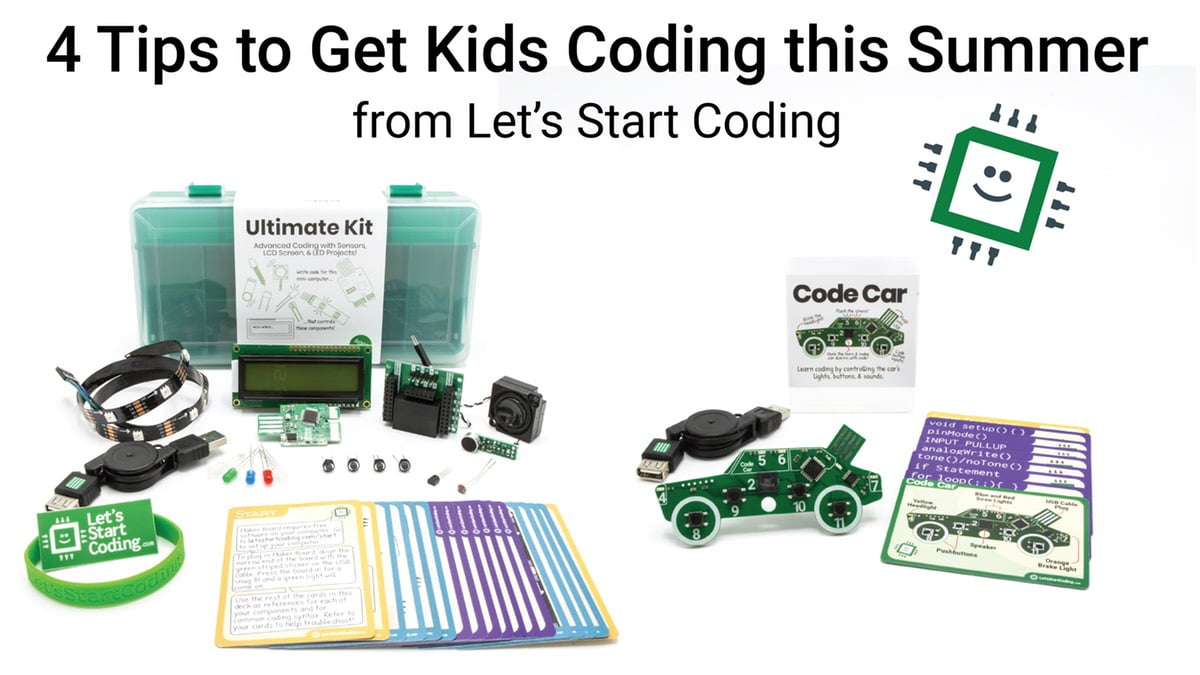As the director of Let’s Start Coding, I’ve introduced hundreds of kids aged 8 and up to our hands-on coding kits. Along the way I’ve learned some tips that you can apply this summer to introduce your kids to typed coding at home.
Let’s Start Coding builds hands-on kits and lessons that teach kids coding. To learn more, jump to the ‘about’ section at the bottom of this article.
Tip 1: Code Consistently
Slow and steady wins. Your kids don’t have to code for 40 hours straight to learn something. Instead, strive for one hour sessions, three times a week. It takes time for them to wrestle with new concepts and to start recognizing code around them (“Hey, the microwave is probably using code! And the fridge!”). Over time, your youngster will start to ‘see’ code everywhere and that will make coding more fun.
Tip 2: Integrate Kids’ Other Interests
Learning to code shouldn’t exclude your kids’ other interests; find ways to integrate those interests with code. I once lead a summer camp where my students were blinking an LED light. Everyone understood the code, but they weren’t thrilled by their new ability.
Instead of pushing to the next project, we spent 30 minutes drawing artwork integrating the blinking LED. One kid drew a Star Wars BB-8 robot and poked the LED through as an ‘eye’. Another drew Van Gogh’s Starry Night and used the LEDs as twinkling stars.
Not only did this get my students thinking differently about code, it improved their coding. My Starry Night student, for example, thought the LED blink was too slow to be a convincing twinkle. She revisited the code to find out how to change the speed of the blink, creating a feedback loop that kept her engaged. By adding context, the code suddenly had a purpose.
Tip 3: Set Your Sights on Exploration, Not Completion
Our kits have numbered projects that introduce coding concepts in sequence. When some parents see these, they think, “Great! My kids will finish these as quickly as possible and they’ll be coders!” Instead, measure success by the number of creative projects your kids build.
Some kids love making songs with the mini speaker that comes in their kit. I’ve seen 500 lines of code to mimic a violin concerto and countless renditions of Mario and Pac-Man music. Because playing tunes is only the second project in the kit, some parents’ impulse is to “move it along” to the next lesson. I’d encourage them to follow that musical interest!
When they’re engaged and excited, kids learn. When they’re focused on completion, coding feels like homework. Coding is a journey, but we’re not looking for the fastest route to completion. For beginners, the goal is to hook them with projects and small wins early.
Tip 4: Engage with Questions
Unless you’re lucky enough to get summer vacation, you won’t be by your child’s side every moment that they’re coding. But you can stoke their interest with questions about their projects, even if the concepts are foreign to you! Some questions I ask kids when they show me their projects:
- Can you show me how the code works?
- What was the hardest thing about building this?
- What improvements do you have in mind for this project?
- Is this a prototype of something you’ve seen before? Is it ‘like’ something else that uses code?
These questions prompt kids to explain their thinking and show off their newfound expertise. This helps cement their learning (and you might even learn something!).
Wrap Up
You could sum up these tips with one phrase: take the leap. If your kids are getting exposed to coding and they’re having fun, that’s success. They may not decide to become computer scientists, but they will benefit from learning how tech works. If you decide to use Let’s Start Coding kits, I hope you’ll find our projects, examples, and support to be helpful along the journey.
About Let’s Start Coding
Let’s Start Coding builds hands-on kits that teach typed coding for kids. Learners download free desktop software that includes step-by-step projects, code walkthroughs, and challenges. As kids complete challenges, they learn about fundamentals of typed code, like variables, functions, and loops. Most importantly, they’re having fun building tangible electronic projects. Kids and parents can use the kits at home with an internet-connected Windows, Mac, or Chromebook computer.
Kits are recommended for kids 8 and up and can be used without any prior coding knowledge. To learn more, visit www.letsstartcoding.com .




Hey everyone,
Weston from Let’s Start Coding here! If you’re interested in getting a coding kit, use the code CODESUMMER at letsstartcoding.com for 10% off any kit. This code expires this Friday (6/8/18) and can only be used once per customer. Thanks for reading!
Lovely, thank you for the insight, I will try and get my kids to do coding, I think it is the essential skill for the future generation.
I think my kid will love it!
Good suggestions. In my experience, it is fairly easy for kids to learn HTML and Javascript. And that gives them skills for making and putting things online. I am helping couple of high school kids develop physics and other science simulations as they learn to code. Checkout their work at SimPop.org
Coding is an excellent activity for children. Of course, coding is an excellent exercise that children can do , when children do not have to go to school and when children do not have to do homework, when they have a lot of free time. Children who are smart, who do homework independently, who write papers independently, and not with the help of the coursework writing service https://uk.papersowl.com/coursework-writing-service, can try programming. Programming develops children’s abilities, but only smart children can cope with writing code!
Nice post, thank you